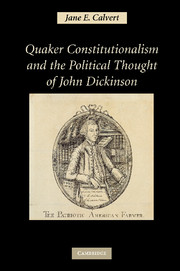Book contents
- Frontmatter
- Contents
- Acknowledgments
- Abbreviations
- Introduction
- I QUAKER CONSTITUTIONALISM IN THEORY AND PRACTICE, C. 1652–1763
- 1 Bureaucratic Libertines: The Origins of Quaker Constitutionalism and Civil Dissent
- 2 A Sacred Institution: The Quaker Theory of a Civil Constitution
- 3 “Dissenters in Our Own Country”: Constituting a Quaker Government in Pennsylvania
- 4 Civil Unity and “Seeds of Dissention” in the Golden Age of Quaker Theocracy
- 5 The Fruits of Quaker Dissent: Political Schism and the Rise of John Dickinson
- II THE POLITICAL QUAKERISM OF JOHN DICKINSON, 1763–1789
- Bibliography
- Index
- References
4 - Civil Unity and “Seeds of Dissention” in the Golden Age of Quaker Theocracy
Published online by Cambridge University Press: 27 July 2009
- Frontmatter
- Contents
- Acknowledgments
- Abbreviations
- Introduction
- I QUAKER CONSTITUTIONALISM IN THEORY AND PRACTICE, C. 1652–1763
- 1 Bureaucratic Libertines: The Origins of Quaker Constitutionalism and Civil Dissent
- 2 A Sacred Institution: The Quaker Theory of a Civil Constitution
- 3 “Dissenters in Our Own Country”: Constituting a Quaker Government in Pennsylvania
- 4 Civil Unity and “Seeds of Dissention” in the Golden Age of Quaker Theocracy
- 5 The Fruits of Quaker Dissent: Political Schism and the Rise of John Dickinson
- II THE POLITICAL QUAKERISM OF JOHN DICKINSON, 1763–1789
- Bibliography
- Index
- References
Summary
Quakers in Pennsylvania spent their first forty years from the 1680s to the 1720s struggling among themselves to realize the ideal structure of a Quaker civil government. As in the establishment of their ecclesiastical polity, there were competing visions for how it should function. And as always, Friends were attempting to determine the extent of popular participation and where the locus of authority should be – in the hands of the people themselves or with their spiritually and politically elite representatives. The dispute within the civil government, as we have seen, resolved itself in favor of the popular branch. The Assembly united against Penn and his agents, considering them an oppressive force, and effectively wrote them out of the constitution as lawmakers.
Until this point, we have considered the difficulties of applying Quaker theologico-political theory at the highest levels of government. But Friends did not confine themselves to shaping merely the government, narrowly construed. They were naturally concerned with the entire polity, which was increasingly non-Quaker. The question now at hand is: What does a political theory that mixes unity and dissent that was originated by a group on the fringes of political power look like when it is subsequently established as the basis of a political system – when the group moves from challenging the state to controlling the state? The short answer seems contradictory: It was at once coercive and antiauthoritarian.
- Type
- Chapter
- Information
- Publisher: Cambridge University PressPrint publication year: 2008



